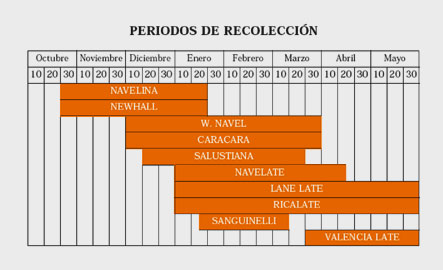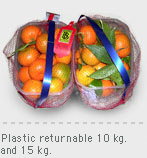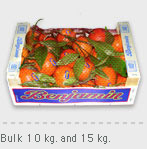History
ranges originally came fom the Amalayan and South China, where wild species can be found that are very similar to our current species. It was apparently in South China where they started to grow oranges about 4,000 years ago, although the first written records appear in China about 2,700 years ago. Although it is known that it was Alexander the Great that introduced most of the citrus fruits from the East, it is not known exactly who introduced oranges into Europe from the Far East. There are several theories that point to Genoese merchants, others say it was the crusaders. The only thing that is known for sure is that the Portuguese did it in the sixteenth century. The oranges were taken to America on the second voyage of Cristopher Columbus. The Arabs introduced them into North Africa and Spain in the tenth century, in both Andalucia and Valencia, where oranges have reached international fame for the best quality.
Properties
The excellent nutritional qualities of oranges have been known since time immemorial. Dr. Gregorio Marañon, for example, in his “Medical Tribute to the Orange”, already manifested its qualities, and since then medical and technical publications have continued to contribute new data about their health benefits..
Next we will show the main characteristics of orange juice.
| Element | Gr./100 gr. of juice |
| Water | 87.4 |
| Reducing sugars | 5.2 |
| Sacharose | 4.7 |
| Acids | 1 |
| Nitrogenate substances | 1 |
| Lipids | 0.33 |
| Dry material | 0.37 |
With respect to vitamin content, orange juice contains the following amounts:
| Element | Mg./100 ml. of juice |
| Vitamin C | 60 mg |
| Vitamin B6 | 60 mg |
| Thianine | 100 mg |
| Riboflavine | 45 mg |
| Biotine | 1 mg |
| Pantotenic Acid | 150 mg |
| Niacine | 250 mg |
The high level of Vitamin C in citrus fruits in comparison with other fruits is well known by everyone, as summarised below:
| Species | Vitamin C (mg./100 gr) |
| Orange | 60 mg |
| Strawberry | 50 mg |
| Melon | 33 mg |
| Apple | 8 mg |
| Grape | 5 mg |
In short, we can say that a glass of orange juice a day provides:
Vitamin C: 100 mg (100% of daily requirements). Vitamin A, B1, B2, B6.
Minerals: Sodium, Potassium, Calcium, Magnesium, Iron, Phosphorus, Sulphur and Chlorine.
Sugars: Fructose, glucose and sacharose.
Amino acids, Flavonoids, Volatiles, Carotenoids, Enzymes and Lipids.
Furthermore, their level of calories is very low due to their low level of carbohydrates, fats and proteins.
All this compendium of essential elements to our good health, gives us innumerable health benefits, and according to Dr. Ana Haro García, of the University of Granada, the habitual consumption of natural orange juice, without any medical supplement or synthetic product will:
• Reinforce the defenses of the organism and prevent and combat infectious processes originating from viruses or from bacteria. The consumption of orange in winter prevents colds and influenza.
• Keep gums, teeth and bones healthy. Orange is rich in calcium, magnesium, phosphorus and vitamin C, which are essential for a good maintenance and growth of the bones. They are highly recommended for osteoporosis, rickets and during periods of bone growth.
• Keep our skin healthy. Vitamin C helps to form collagen, which is essential for the epidermis.
• Prevent the formation of coagulations and thrombosis and inhibits the accumulation of plaque, being very useful in the treatment and prevention of cardiovascular diseases.
• Help combat anaemia. Its content in vitamin C favours the absorbtion of iron by the organism.
• Exert an antioxidising effect and avoid the harm caused by free radicals which cause degenerative diseases such as arteriosclerosis, cancer and the ageing process, and also chronic illnesses derived from tobacco consumption. Oranges contain four highly efficient antioxidants which mutually enhance each others- effects, namely, vitamin C, quercine, provitamin A and folic acid.
• Help normalize high cholesterol levels in the blood, due to the presence of pectine (soluble fibre).
• Prevent constipation and intestinal atony due to its fibre content. One glass of orange juice on an empty stomach is a very efficient remedy for constipation.
• Prevent allergies. The daily consumption of oranges seems to prevent the appearance of allergic reactions such as rhinitis or bronchial asthma. Scientific studies have demonstrated a possible relation between high levels of vitamin C in the blood and a reduced risk of allergies.
• Contribute to the cure of gout. It facilitates the dissolution and elimination of urate deposits which cause gout.
• Prevent the appearance of some kinds of cancer. The combined effect of vitamin C, flavonoids and limonoids, can prevent and slow the development of malignant tumours because they can neutralize the cancer-causing substances that trigger the tumour processes. In fact the International Cancer Institute of USA, attributes the reduction of stomach cancers in recent years to the massive consumption of orange juice.
That is why we believe that a daily intake of orange juice is very important for a healthy diet, as well as in order to practise preventative medicine for all the complaints previously mentioned.
Recipes
Duck a l'orange with grapes
Ingredients:
For 4 persons
1 clean duck of 1.2 kg
5 oranges
1/2 lemon
2 glasses of stock
1 glass of white wine
2 onions or spring onions
1 carrot
1 green pepper
1 leek
1 tomato
3 cloves of garlic
2 tablespoons of flour
1 small glass of orange liqueur
a few orange segments
1 small bunch of packaged grapes
1 piece of butter
olive oil
salt and pepper
Preparation:
Chop all the vegetables and put them in a dish or oven tray. Add salt and pepper to the clean duck and place half an orange inside it. Squeeze the juice from the rest of the oranges oranges and half a lemon onto the duck. Add also the stock and the white wine. Pour on a little olive oil and cook at 175? for approximately one hour until the duck is done. Pour the sauce over the top from time to time so that it doesn't get dry. Once it is ready, take out the duck and prepare the sauce with the rest of the ingredients. Add the flour and the orange liqueur heating it gently for 5 minutes. Next, put it through a passe-purée. Serve the duck cut in half, without its skeleton and covered in sauce. Accompany with a guarnition of orange segments and grapes and a little butter.
Orange Tart al café
Ingredients:
For 4 persons
250 g of flour
125 g of butter
1 pinch of salt
2 eggs
1 teaspoon of yeast
50 g of sugar
1 orange
200 g of orange marmelade
-For the coffee cream:
2 tablespoons of ground coffee
250 g of butter
100 g of sugar
1 egg yolk
Preparation:
Sprinkle flour over a separable mould and cover it with the paste prepared previously. Cook in the oven for about 25 minutes until it is golden brown. Mix the butter into the sugar at room temperature with the help of a spatula. Then add one egg yolk and the coffee dissolved in a few drops of water. When it is all well mixed, add the orange marmelade. Put all the mixture into the middle of the tart. For decoration, put water with sugar on to boil. Once boiled, put a few slices of orange to give flavour. Then put the slices of orange onto the filling.
Seasonal calendar

Varieties
---
Packaging
 |
 |
 |